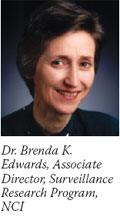 |


Time Spent Is a Significant Burden on Cancer Patients
Calculating the burden of cancer is not simple, especially when it comes to nonmedical costs such as patient time lost to cancer care. A study from the January 3 Journal of the National Cancer Institute (JNCI) estimated that in 2005 the value of patient time lost to cancer care was nearly $2.3 billion in the first year following diagnosis alone. This estimate was based on just over 1 million newly diagnosed cancer patients in 2005, millions of hours traveling to and from, waiting for, and receiving treatment, and a median wage rate of $15.23 per hour.
"To our knowledge, this study is the first to estimate net patient time costs over the full course of cancer care, for 11 of the most common cancer sites," said the study's lead author, Dr. Robin Yabroff, an epidemiologist in NCI's Division of Cancer Control and Population Sciences (DCCPS). She and her colleagues used a phase-of-care approach, which distinguishes three clinically relevant phases of care: the initial year after diagnosis, the last year of life, and the continuing or monitoring phase, which includes the time between the initial year and last year of life. Read more 



Guest Update by Dr. Brenda K. EdwardsSEER: Research Power in Numbers
 NCI's Surveillance Epidemiology and End Results (SEER) Program is a powerful cancer research tool that has served as the basis for thousands of studies. Innovative use of SEER data has produced additional statistics such as cancer prevalence, which is important to national estimates of cancer survivorship. NCI's Surveillance Epidemiology and End Results (SEER) Program is a powerful cancer research tool that has served as the basis for thousands of studies. Innovative use of SEER data has produced additional statistics such as cancer prevalence, which is important to national estimates of cancer survivorship.
Although many people equate SEER with the Annual Report to the Nation, the main reason for its popularity is rooted in the fact that SEER is the most comprehensive, population-based cancer registry in the world. It currently covers 26 percent of the U.S. population, and captures information on patient demographics, primary tumor site and morphology, stage at diagnosis, first course of treatment, and survival. Read more 
 |
The NCI Cancer Bulletin is produced by the National Cancer Institute (NCI). NCI, which was established in 1937, leads the national effort to eliminate the suffering and death due to cancer. Through basic, clinical, and population-based biomedical research and training, NCI conducts and supports research that will lead to a future in which we can identify the environmental and genetic causes of cancer, prevent cancer before it starts, identify cancers that do develop at the earliest stage, eliminate cancers through innovative treatment interventions, and biologically control those cancers that we cannot eliminate so they become manageable, chronic diseases.

For more information on cancer, call 1-800-4-CANCER or visit http://www.cancer.gov.

NCI Cancer Bulletin staff can be reached at ncicancerbulletin@mail.nih.gov.
|
|